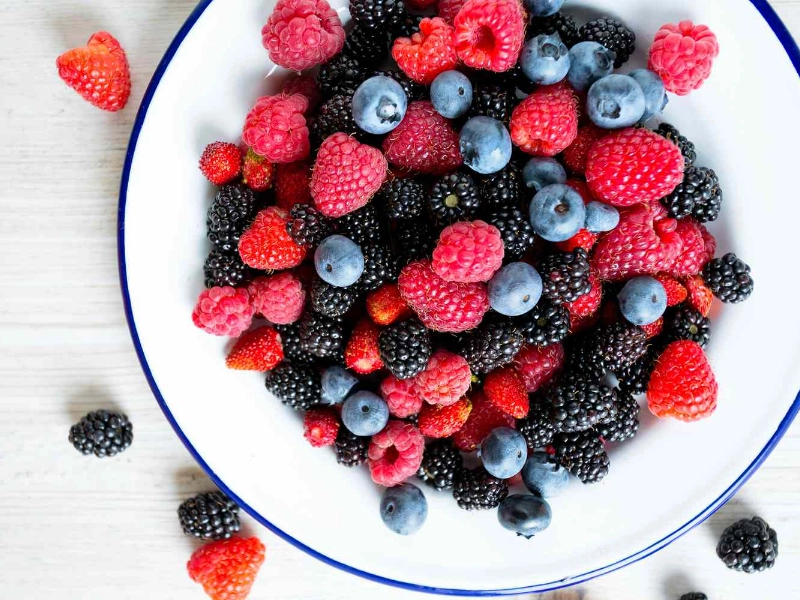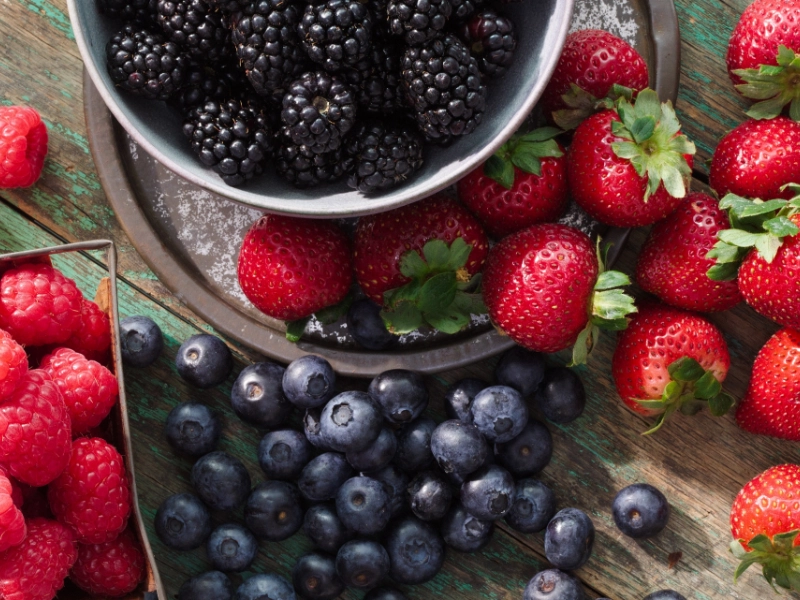General well-being depends on a healthy digestive system, hence including berries into your diet will make a big impact. Not only are these little, vibrant fruits delightful, but they also abound in nutrients that help digestive wellness. Rich in vitamins, antioxidants, and fibre, berries can help to balance intestinal flora, lower inflammation, and encourage regular bowel motions. This post investigates the several ways berries support digestive health as well as simple strategies to include them in your regular diet.
 The great fibre content of berries is among their most important advantages. Maintaining a good digestive system depends on fibre since it promotes regular bowel motions and helps to avoid constipation. Particularly high in dietary fibre, berries such strawberries, blackberries, and raspberries are a great choice for anyone trying to boost their digestive health.
By increasing the volume of the faeces, fibre helps it pass easily through the intestines. This encourages consistency as well as helps avoid problems including discomfort and bloating. Furthermore contributing to general health include fiber's ability to assist control blood sugar levels and decrease cholesterol. Including a range of berries in your diet helps you boost your fibre intake and therefore support your digestive system.
The great fibre content of berries is among their most important advantages. Maintaining a good digestive system depends on fibre since it promotes regular bowel motions and helps to avoid constipation. Particularly high in dietary fibre, berries such strawberries, blackberries, and raspberries are a great choice for anyone trying to boost their digestive health.
By increasing the volume of the faeces, fibre helps it pass easily through the intestines. This encourages consistency as well as helps avoid problems including discomfort and bloating. Furthermore contributing to general health include fiber's ability to assist control blood sugar levels and decrease cholesterol. Including a range of berries in your diet helps you boost your fibre intake and therefore support your digestive system.
 Antioxidants abound in berries, and they are quite important for lowering body inflammation. Conditions such irritable bowel syndrome (IBS) and inflammatory bowel disease (IBD) can result from chronic inflammation impairing digestive function. Berries, with their antioxidants—including vitamin C and flavonoids—help fight oxidative stress and guard the digestive tract from damage.
For instance, blueberries are quite high in antioxidants and have been found in many studies to lower inflammation. Regularly eating berries can encourage a better digestive system and assist to reduce inflammation. For those who might have pre-existing diseases exacerbated by inflammation or intestinal discomfort, this is especially crucial.
Antioxidants abound in berries, and they are quite important for lowering body inflammation. Conditions such irritable bowel syndrome (IBS) and inflammatory bowel disease (IBD) can result from chronic inflammation impairing digestive function. Berries, with their antioxidants—including vitamin C and flavonoids—help fight oxidative stress and guard the digestive tract from damage.
For instance, blueberries are quite high in antioxidants and have been found in many studies to lower inflammation. Regularly eating berries can encourage a better digestive system and assist to reduce inflammation. For those who might have pre-existing diseases exacerbated by inflammation or intestinal discomfort, this is especially crucial.
 Apart from their antioxidant and fibre value, some berries also have prebiotics, which are crucial for intestinal condition. Food for helpful gut bacteria are non-digestible fibres called prebiotics. Appropriate digestion, nutritional absorption, and immune system operation all depend on a good balance of gut flora.
Blueberries and strawberries among other berries can support a good microbiome by helping beneficial bacteria in the gut flourish. Improved digestion and the prevention of gastrointestinal diseases depend on a healthy gut flora, which also helps avoid Including a range of berries in your diet helps you to boost your general digestive health and feed your gut bacteria.
Apart from their antioxidant and fibre value, some berries also have prebiotics, which are crucial for intestinal condition. Food for helpful gut bacteria are non-digestible fibres called prebiotics. Appropriate digestion, nutritional absorption, and immune system operation all depend on a good balance of gut flora.
Blueberries and strawberries among other berries can support a good microbiome by helping beneficial bacteria in the gut flourish. Improved digestion and the prevention of gastrointestinal diseases depend on a healthy gut flora, which also helps avoid Including a range of berries in your diet helps you to boost your general digestive health and feed your gut bacteria.
 Berries are easy and great addition to your diet. Their adaptability for different meals and snacks comes from their fresh, frozen, or dried state. For a healthy morning, start your day with a berry smoothie combining your preferred fruits with yoghurt or almond milk. For extra taste and nutrients, toss berries on top of yoghurt or muesli.
Think about including berries into salsas or salads for lunch or dinner. Both cool and nutritious is a fresh spinach salad topped with strawberries and a mild vinaigrette. Berries are also a pleasant treat with great nutritional value that you can use in baking—muffins or pancakes. The countless choices make it simple to appreciate the advantages of berries while tantalising your taste receptors.
Berries are easy and great addition to your diet. Their adaptability for different meals and snacks comes from their fresh, frozen, or dried state. For a healthy morning, start your day with a berry smoothie combining your preferred fruits with yoghurt or almond milk. For extra taste and nutrients, toss berries on top of yoghurt or muesli.
Think about including berries into salsas or salads for lunch or dinner. Both cool and nutritious is a fresh spinach salad topped with strawberries and a mild vinaigrette. Berries are also a pleasant treat with great nutritional value that you can use in baking—muffins or pancakes. The countless choices make it simple to appreciate the advantages of berries while tantalising your taste receptors.
Though all berries have health advantages, some are especially good for digestive health. Among the richest in fibre, raspberries and blackberries are great selections for encouraging regularity. Antioxidant qualities of blueberries are well-known; these aid to lower digestive system irritation. Whenever you can, choose fresh, organic berries to limit your pesticide exposure. Since seasonal berries are frequently more delicious and healthful, think about going to neighbourhood markets for the freshest choices. Frozen berries can be a fantastic substitute if fresh berries are not available since they mostly preserve their nutrients and taste. Choosing the correct berries will help you to maximise their advantages for digestion.
Including berries in your diet improves general wellness as well as digestive health. Berries' minerals and vitamins—including vitamin C, potassium, and folate—are vital for preserving a healthy body. Regular berry intake has been connected to several health advantages including better heart health, greater cognitive activity, and a stronger immune system. Giving berries top priority in your diet can help you design a tasty and nutrient-dense eating plan that supports your digestive system and general wellness. Berries are a great aid in encouraging a healthy lifestyle whether your preferred consumption is as a snack, in smoothies, or during a meal. Accept the goodness of these fruits and take use of their several advantages for your digestive system.